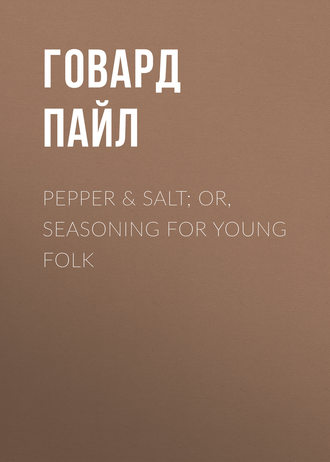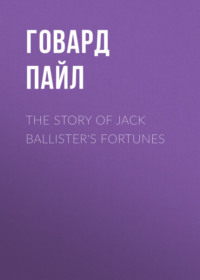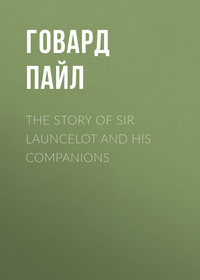 полная версия
полная версияPepper & Salt; or, Seasoning for Young Folk
Presently the master of black-arts went to the pot of broth, and, taking off the lid, began smelling of it. But no sooner had he sniffed a smell of the steam than he began thumping his head with his knuckles, and tearing his hair, and stamping his feet. "Somebody's had a finger in my broth!!!" he roared. For the master knew at once that all the magic had been taken out of it by the touch of Claus's finger.
As for poor Claus, he was so frightened that he fell upon his knees, and began begging: "Oh! dear master – " But he got no further than this, for the master bawled at him,
"You have taken the best,You may have the rest."And so saying, he threw pot and broth and all at Claus, so that if he hadn't ducked his head he might have been scalded to death. Then Claus ran out into the street, for he saw that there was no place for him to stay in that house.
Now in the street there was a cock and a hen, scratching and clucking together in the dust, and Claus understood every word that they said to each other, so he stopped and listened to them.
This is what they said:
The cock said to the hen, "Yonder goes our new serving-man."
And the hen said to the cock, "Yes, yonder he goes."
And the cock said to the hen, "He is leaving the best behind him."
And the hen said to the cock, "What is it that he is leaving?"
And the cock said to the hen, "He is leaving behind him the witch-hazel staff that he brought with him."
And the hen said to the cock, "Yes, that is so. He would be a fool to leave that behind, yet he is not the first one to think that peas are pebbles."
As for Claus, you can guess how he opened his eyes, for he saw how the land lay, and that he had other ears than he had before.
"Hui!" said he, "that is good! I have bought more for my penny than I had in my bargain."
As for the hazel staff, he was not going to leave that behind, you may be sure. So he sneaked about the place till he laid hand on it again; then he stepped away, right foot foremost, for he did not know what the master of black-arts might do to him if he should catch him.
Well, after he had left the town, he went along, tramp! tramp! tramp! until, by-and-by, he grew tired and sat down beneath an oak-tree to rest himself.
Now, as he sat there, looking up through the leaves, thinking of nothing at all, two ravens came flying and lit in the tree above him. After a while the ravens began talking together, and this was what they said:
The one raven said, "Yonder is poor Claus sitting below us."
And the other raven said, "Poor Claus, did you say, brother? Do you not see the witch-hazel lying on the ground beside him?"
The one raven said, "Oh yes; I see that, but what good does it do him?"
And the other raven said, "It does him no good now, but if he were to go home again and strike on the great stone on the top of the hill back of Herr Axel's house, then it would do him good; for in it lies a great treasure of silver and gold."
Claus had picked up his ears at all this talk, you may be sure. "See," said he, "that is the way that a man will pass by a great fortune in the little world at home to seek for a little fortune in the great world abroad" – which was all very true. After that he lost no time in getting back home again.
"What! are you back again?" said Hans.
"Oh yes," said Claus, "I am back again."
"That is always the way with a pewter penny," said Hans – for that is how some of us are welcomed home after we have been away.
As for Claus, he was as full of thoughts as an egg is of meat, but he said nothing of them to Hans. Off he went to the high hill back of Herr Axel's house, and there, sure enough, was the great stone at the very top of the hill.
Claus struck on the stone with his oaken staff, and it opened like the door of a beer vault, for all was blackness within. A flight of steps led down below, and down the steps Claus went. But when he had come to the bottom of the steps, he stared till his eyes were like great round saucers; for there stood sacks of gold and silver, piled up like bags of grain in the malt-house.
At one end of the room was a great stone seat, and on the seat sat a little manikin smoking a pipe. As for the beard of the little man, it was as long as he was short, for it hung down so far that part of it touched the stone floor.
"How do you find yourself, Claus?" said the little manikin, calling Claus by his name.
"So good!" said Claus, taking off his hat to the other.
"And what would you like to have, Claus?" said the little man.
"I would like," said Claus, "to have some money, if you please."
"Take what you want," said the little man, "only do not forget to take the best with you."
Oh no; Claus would not forget the best; so he held the staff tighter than ever in his fist – for what could be better than the staff that brought him there? So he went here and there, filling his pockets with the gold and silver money till they bulged out like the pockets of a thief in the orchard; but all the time he kept tight hold of his staff, I can tell you.
When he had as much as his pockets could hold, he thanked the little manikin and went his way, and the stone door closed behind him.
And now Claus lived like a calf in the green corn-field. Everything he had was of the best, and he had twice as much of that as any of the neighbors. Then how brother Hans stared and scratched his head and wondered, when he saw how Claus sat in the sun all day, doing nothing but smoking his pipe and eating of the best, as though he were a born prince! Every day Claus went to the little man in the hill with his pockets empty, and came back with them stuffed with gold and silver money. At last he had so much that he could not count it, and so he had to send over to brother Hans for his quart-pot, so that he might measure it.
But Hans was cunning. "I will see what makes brother Claus so well-off in the world all of a sudden," said he; so he smeared the inside of the quart-pot with bird-lime.
Then Claus measured his gold and silver money in Hans's quart-pot, and when he was done with it he sent it back again. But more went back with the quart-pot than came with it, for two gold-pieces stuck to the birdlime, and it was these that went back with the pot to brother Hans.
"What!" cried Hans, "has that stupid Claus found so much money that he has to measure it in a quart-pot? We must see the inside of this business!" So off he went to Claus's house, and there he found Claus sitting in the sun and smoking his pipe, just as though he owned all of the world.
"Where did you get all that money, Claus?" said Hans.
Oh! Claus could not tell him that.
But Hans was bound to know all about it, so he begged and begged so prettily that at last Claus had to tell him everything. Then, of course, nothing would do but Hans must have a try with the hazel staff also.
Well, Claus made no words at that. He was a good-natured fellow, and surely there was enough for both. So the upshot of the matter was that Hans marched off with the hazel staff.
But Hans was no such simpleton as Claus; no, not he. Oh no, he would not take all that trouble for two poor pocketfuls of money. He would have a bagful; no, he would have two bagfuls. So he slung two meal sacks over his shoulder, and off he started for the hill back of Herr Axel's house.
When he came to the stone he knocked upon it, and it opened to him just as it had done for Claus. Down he went into the pit, and there sat the little old manikin, just as he had done from the very first.
"How do you find yourself, Hans?" said the little old manikin.
Oh, Hans found himself very well. Might he have some of the money that stood around the room in the sacks?
Yes, that he might; only remember to take the best away with him.
Prut! teach a dog to eat sausages. Hans would see that he took the best, trust him for that. So he filled the bags full of gold, and never touched the silver – for, surely, gold is better than anything else in the world, says Hans to himself. So, when he had filled his two bags with gold, and had shaken the pieces well down, he flung the one over one shoulder, and the other over the other, and then he had as much as he could carry. As for the staff of witch-hazel, he let it lie where it was, for he only had two hands and they were both full.
But Hans never got his two bags of gold away from the vault, for just as he was leaving – bang! came the stone together, and caught him as though he was a mouse in the door; and that was an end of him. That happened because he left the witch-hazel behind.
That was the way in which Claus came to lose his magic staff; but that did not matter much, for he had enough to live on and to spare. So he married the daughter of the Herr Baron (for he might marry whom he chose, now that he was rich), and after that he lived as happy as a fly on the warm chimney.
Now, this is so – it is better to take a little away at atime and carry your staff with you, than totake all at once and leave it behind.VENTURESOME BOLDNESS
A tailor came a-walking by,The fire of courage in his eye."Where are you going Sir?" Said I."I slew a mouseIn our houseWhere other tailors live," said he,"And not a JackAmong the packWould dare to do the like; pardie!Therefore, I'm going out to tryIf there be greater men that I;Or in the landAs bold a handAt wielding brand as I, you see!"The tailor came a-limping byWith woful face and clothes awryAnd all his courage gone to pie."I met a knightIn armor brightAnd bade him stand and draw," said he;"He straightaway didAs he was bid,And treated me outrageously.So I shall get me home again,And probably shall there remain.A little man.Sir, always canBe great with folk of less degree!"H. PyleSUPERFICIAL CULTURE
I'll tell of a certain old dame;The sameHad a beautiful piggy, whose nameWas James;and whose beauty and worth,From the day of his birth,Were matters of popular fame,And his claimTo gentility no one could blame.So, seeing his promise, she thoughtShe oughtTo have him sufficiently taughtThe artOf deportment, to goInto company; soA master of dancing she brought,Who was fraughtWith a style which the piggiwig caught.So his company manners were rare.His careOf social observances thereWould bearThe closest inspection,And not a reflectionCould rest on his actions, howe'erYou might careTo examine 'em down to a hair.Now, things went beau-ti-ful-ly,Till heFell in love with a dame of degree;Pardie!When he tried for to speak,But could only say, "O w-e-e-k!"For, whatever his polish might be,Why, dear me!He was pig at the bottom, you see.H. PYLEHow Dame Margery Twist saw more than was good for her
If one could always hold one's tongue as to what one sees, one would be the better for it. They are the wise people of this world who keep silence as to what they see; many such there are who behold things such as neither you nor I may ever hope to look upon, and yet we know nothing of this because they say nothing of it, going their own ways like common folks, and as though they saw nothing in an egg but the meat.
Dame Margery Twist of Tavistock town was not one of these wise folks who hold their tongues; she was a good, gossiping, chattering old soul, whose hen never hatched a chick but all of the neighbors knew of it, as the saying goes. The poor old creature had only one eye; how she lost the other you shall presently hear, and also how her wonderful tulip garden became like anybody else's tulip garden.
Dame Margery Twist lived all alone with a great tabby cat. She dwelt in a little cottage that stood back from the road, and just across the way from the butcher's shop. All within was as neat and as bright as a new pin, so that it was a delight just to look upon the row of blue dishes upon the dresser, the pewter pipkins as bright as silver, or the sanded floor, as clean as your mother's table. Over the cottage twined sweet woodbines, so that the air was ladened with their fragrance in the summer-time, when the busy, yellow-legged bees droned amid the blossoms from the two hives that stood along against the wall. But the wonder of the garden was the tulip bed, for there were no tulips in all England like them, and folks came from far and near, only to look upon them and to smell their fragrance. They stood in double rows, and were of all colors – white, yellow, red, purple, and pied. They bloomed early, and lasted later than any others, and, when they were in flower, all the air was filled with their perfume.
Now all of these things happened before the smoke of the factories and the rattling of the steam-cars had driven the fairy folks away from this world into No-man's-land, and this was the secret of the dame's fine tulip bed. For the fairies dwelt among the flowers, and she often told her gossips how that she could hear the fairy mothers singing their babies to sleep at night, when the moon was full and the evening was warm. She had never seen the little folks herself, for few folks are given to look upon them, and Dame Margery's eyes were not of that nature. Nevertheless, she heard them, and that, in my opinion, is the next best thing to seeing them.
Dame Margery Twist, as I said, was a good, kind, comfortable old soul, and was, moreover, the best nurse in all of Tavistock town. Was any one ill, it was Dame Margery who was called upon to attend him; as for the dame herself, she was always ready to bring a sick body into good health again, and was always paid well for the nursing.
One evening the dame was drinking her tea by herself with great comfort. It was just at the dusking of the twilight; the latticed window was opened, so that the little breezes came rushing into the room, or stayed a while to play wantonly with the white linen curtains. The tabby cat was purring in the door-way, and the dame was enjoying the sweetness of the summer-time. There came a knock at the door, "Who is it?" said Dame Margery.
"It's Tommy Lamb, if you please, ma'am," said a little voice.
"Come in, Tommy," said the dame.
So in came Tommy Lamb, a little, curly-headed fellow, not any older than you, "What is it you want, Tommy?" said the dame.
"If you please, ma'am, there's a little gentleman outside, no taller than I be; he gave me this box, and told me to tell you to rub your eyes with the salve and then to come out to him."
The dame looked out of the window, but never a body stood there that she could see. "Where is the gentleman, dearie?" said she.
"Yonder he is, with a great white horse standing beside him," said Tommy Lamb, and he pointed with his finger as he spoke.
The dame rubbed her eyes and looked again, but never a thing did she see but the green gate, the lilac-bushes, and the butcher's shop opposite. The truth of the matter is, that little children like you, my dear, see things which we grown folks, with the dust of the world in our eyes, may never behold. "Well," said Dame Margery to herself, "this is strange, for sure! I see no little old gentleman in green." Then she opened the box that she held, and looked into it and saw that it was filled with a green salve. "I'll rub some of it on my eyes, at any rate," said she; whereupon she did so. Then she looked again, and, lo and behold! there stood a little old man, no taller than Tommy Lamb. His face was as brown, and as withered, and as wrinkled as a winter's crab-apple left on the bare tree when the frost is about. He was dressed all in green from top to toe, and on his head was a tall green cap, with a bell at the peak, which tinkled at every movement of his head. By his side stood a great, tall, milk-white horse, with a long tail and mane tied with party-colored ribbons.
Dame Margery went out to the little old gentleman in green, and asked him what he would have with her. He told the dame that his wife was sorely sick, and that he wanted her to come and nurse her for the night. At this Dame Margery hemmed and hawed and shook her head, for she did not like the thought of going out at night, she knew not where, and with such a strange little body. Then the little man begged her and pleaded with her, and his voice and his words were as sweet as honey. At last he persuaded her to go, promising her a good reward if she would nurse his wife back into her health again. So the dame went back into the cottage to make ready for her journeying, throwing her red riding-cloak over her shoulders, and drawing her thick shoes upon her feet. Then she filled her reticule with a parcel of simples, in case they should be needed. After this she came out again, and climbed up behind the little man in green, and so settled herself upon the pillion saddle for her ride. Then the little man whistled to his horse, and away they went.
They seemed to fly rather than ride upon the hard ground, for the hedges and cottages and orchards flew past as though in a dream. But fast as they went, the old dame saw many things which she had never dreamed of before. She saw all of the hedge-rows, the by-ways, the woods and fields alive with fairy-folk. Each little body was busy upon his or her own business, laughing, chatting, talking, and running here and there like folks on a market-day.
So they came at last to a place which the dame knew was the three-tree-hill; but it was not the three-tree-hill which she had seen in all of her life before, for a great gateway seemed to open into it and it was into this gateway that the little man in green urged the great white horse.
After they had entered the hill, Dame Margery climbed down from the pillion and stood looking about her. Then she saw that she was in a great hall, the walls of which were glistening with gold and silver, while bright stones gleamed like so many stars all over the roof of the place. Three little fairy children were playing with golden balls on the floor, and when they saw the dame they stopped in their sport and stood looking silently upon her with great, wide-opened eyes, just as though they were little mortal children. In the corner of the room was a bed all of pure gold, and over the bed were spread coverlets of gold and silver cloth, and in the bed lay a beautiful little lady, very white and ill. Then Dame Margery knew well enough that every one of these little people were fairies.
The dame nursed the fairy lady all that night, and by cock-crow in the morning the little woman had ease from her pain.
Then the little man spoke for the first time since Dame Margery had left home. "Look'ee, Dame Margery," said he; "I promised to pay you well and I will keep my word. Come hither!" So the dame went to him as he had bidden her to do, and the little man filled her reticule with black coals from the hearth. The dame said nothing, but she wondered much whether the little man called this good pay for her pains. After this she climbed up on the great horse again, and behind the little man, and they rode out of the place and home, where they were safe and sound ere the day had fairly broken. But before the little man had left her he drew out another little box just like the one that Tommy Lamb had brought her the evening before, only this time the box was filled with red ointment. "Rub your eyes with this, Dame Margery," said he.
Now Dame Margery Twist knew butter from cheese, as the saying is. She knew that the green salve was of a kind which very few people have had rubbed over their eyes in this world; that it was of a kind which poets would give their ears to possess – even were it a lump no larger than a pea. So, when she took the box of red ointment, she only rubbed one eye with it – her left eye. Her right eye she pretended to rub, but, in truth, she never touched it at all.
Then the little man got upon his horse again, and rode away to his home in the hill.
After he had gone away, Dame Margery thought that she would empty her reticule of the dirty black coals; so she turned it topsy-turvy, and shook it over the hearth, and out tumbled – black coals? No; great lumps of pure gold that shone bright yellow, like fire, in the light of the candle. The good dame could scarcely believe her eyes, for here was wealth enough to keep her in comfort for all the rest of her days.
But Dame Margery's right eye! I wish I could only see what she saw with that right eye of hers! What was it she saw? That I will tell you.
The next night was full moon, and Dame Margery came and looked out over the fine bed of tulips, of which she was very proud. "Hey-day!" she cried, and rubbed her eyes, in doubt as to whether she was asleep or awake, for the whole place was alive with little folks.
But she was awake, and it was certain that she saw them. Yes; there they were – little men, little women, little children, and little babies, as thick in the tulip bed as folks at a wedding. The little men sat smoking their pipes and talking together; the little women sat nursing their babies, singing to them or rocking them to sleep in cradles of tulip flowers; the little children played at hide-and-seek among the flower-stalks. So the dame leaned out of the window, watching them with great delight, for it is always a delight to watch the little folks at their sports.
After a while she saw where one of the tiny fairy children hid himself under a leaf, while the others who were to seek him looked up and down, and high and low, but could find him nowhere. Then the old dame laughed and laughed to see how the others looked for the little fellow, but could not tell where he was. At last she could hold her peace no longer, but called out in a loud voice, "Look under the leaf, Blackcap!"
The words were no sooner out of her mouth than, whisk! whirr! off they scampered out of the garden and away – fathers, mothers, children, babies, all crying in their shrill voices, "She sees us! she sees us!" For fairies are very timid folk, and dread nothing more than to have mortals see them in their own shapes.
So they never came back again to the dame's garden, and from that day to this her tulips have been like everybody else's tulips. Moreover, whenever she went out the fairies scampered away before her like so many mice, for they all knew that she could see them with her magical eye. This, as you may see, was bad enough, but no other harm would have come of it if she had only gathered wisdom at that time, seeing what ill came of her speech. But, like many other old dames that I wot of, no sound was so pleasant to her ears as the words of her own mouth.
Now, about a twelvemonth after the time that the dame had nursed the fairy lady, the great fair was held at Tavistock. All the world and his wife were there, so, of course, Dame Margery went also. And the fair was well worth going to, I can tell you! Booths stood along in a row in the yellow sunlight of the summer-time, and flags and streamers of many colors fluttered in the breeze from long poles at the end of each booth. Ale flowed like water, and dancing was going on on the green, for Peter Weeks the piper was there, and his pipes were with him. It was a fine sight to see all of the youths and maids, decked in fine ribbons of pink and blue, dancing hand-in-hand to his piping. In the great tent the country people had spread out their goods – butter, cheese, eggs, honey, and the like – making as goodly a show as you would want to see. Dame Margery was in her glory, for she had people to gossip with everywhere; so she went hither and thither, and at last into the great tent where these things of which I have spoken were all spread out for show.
Then, lo and behold! who should she see, gliding here and there among the crowd of other people, but the little man in green whom she had seen a year ago. She opened her eyes mightily wide, for she saw that he was doing a strange thing. By his side hung a little earthenware pot, and in his hand he held a little wooden scraper, which he passed over the rolls of butter, afterwards putting that which he scraped from the rolls into the pot that hung beside him. Dame Margery peeped into the pot, and saw that it was half full; then she could contain herself no longer.
"Hey-day, neighbor!" cried she, "here be pretty doings, truly! Out upon thee, to go scraping good luck and full measure off of other folks' butter!"
When the little man in green heard the dame speak to him, he was so amazed that he nearly dropped his wooden scraper. "Why, Dame Margery! can you see me then?"
"Aye, marry can I! And what you are about doing also; out upon you, say I!"









